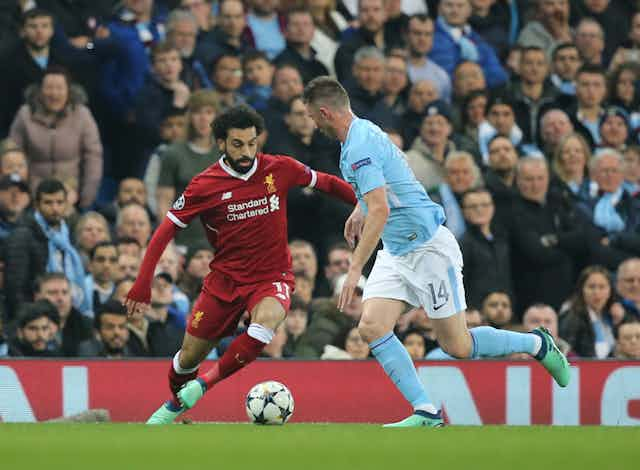I’m a lucky man. A sports sociologist by trade, I’m in Madrid to see my eighth European Cup final involving my club, Liverpool FC – “the Mighty Reds”. For people my age (65) and from my city (Liverpool), this competition will always be known as the European Cup – rather than the Champions League – because of its history and character. And we’ve won it five times, after all.
This time, I have an assured match ticket to Saturday’s game – a cool £154 dropped into UEFA’s coffers – and even somewhere to stay. I booked up in December: you do need outrageous hope in football, even if only to avoid the crippling costs of support.
In 2018, when the Reds played Real Madrid in the final in Kiev, Ukraine, I paid £1,000 for flights, slept overnight in Warsaw airport and later on a friend’s apartment floor. Was I mad? All that suffering, just to see our star forward, the Egyptian Mo Salah, being ruinously fouled after only 30 minutes. It looked like game over – and just to confirm it, our young goalkeeper, Loris Karius, decided to throw two Real Madrid attempts into his own net. He (and we) ended up in tears.
Quite by chance – and considerable good fortune – I managed to miss Liverpool’s terrible 1985 Heysel Stadium final in Brussels, when hooliganism and inept organisation rendered the whole thing catastrophic and meaningless as sport. Tragically, 39 fans were killed. But – and all academic objectivity goes flying away here – I have cried with joy in Rome (1977 and 1984); cavorted at Wembley (1978); jigged in Paris (1981); and gasped in amazement at the miracle of Istanbul (2005) when we came back from three goals down. I even wrote a book about it. In 2007, in Athens, it was only defeat and chaotic despair. You might say I have some experience of the highs and lows of these events.
And yet the 2019 final is entirely different, even for me. Because this time, Liverpool is facing another English club, Tottenham Hotspur – a talented team, but rookies when it comes to top-flight European football.
This England takeover of the final has happened only once before, in 2008 in Moscow. Then, Manchester United defeated Chelsea on penalties in the Russian rain. That final seemed strangely lacking in the contrasts and exotica which makes the European competition so special because of its usual international flavour.
Read more: Premier League: how England's clubs swept to European football dominance
Indeed, it feels like we have been cheated of a proper European occasion in 2019, too. Spurs are high-class opposition, for sure, but we can play them any time at home. I’ll bet our north London rivals feel exactly the same.
What about the Greens?
Environmentalists might wonder, not unreasonably, at the carbon bootprint left by flying tens of thousands of fans from England across Europe to play a match that could so easily (and much more cheaply) have been decided in the UK. But a global game will always involve international travel.
Smart alecs might also argue that mixing it in Madrid with our London rivals in 2019 is a sort of Champions League final for the Brexit era. Why do we need continental opponents when it is so obvious that we, the English, are the best?
The commercial power and strength of the club game in England is clear. But this is different, of course, from talking about the English game, because our coaches and key players are drawn from distant parts of the globe. Liverpool FC has as many Brazilians and Africans as Englishmen in its first team. Indeed, England manager Gareth Southgate recently predicted, glumly, that soon only 15% of top Premier League players might qualify to play for England.
So why does the current version of European football still matter, even though we are playing all-too-familiar Premier League opposition in its blue-riband event? Perhaps because, against all reason, a club such as Liverpool still overwhelmed mighty Barcelona by four goals in the semi final, in the same raucous working-class location it has played in since 1892, and in only the tenth competitive meeting between these clubs in their entire combined histories (I so wish you could have been there).
Or, because the commercially modest Dutch masters, Ajax – a truly great name in European football’s past – can, even in the age of billionaire oil and state club ownership and Premier League power, build a thrilling young team and come within seconds of beating Spurs in their semi-final. Now, if Liverpool were playing Ajax in Madrid that would be a proper European Cup final – sorry, Spurs.
It is that precious uncertainty and search for collective glory which is why we still watch. And why misguided, ageing, supporters spend mad money to sleep fitfully overnight in Eastern European airports and Kiev floors. Because, my friends, that is emotionally invested sport, not business.
Come on, you Reds!

